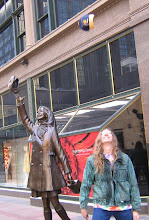Anyway, the film sounds interesting, as he's taping Monopoly tournaments all over the world, and since it might have a minute or two of me in it, I'll keep everyone updated. And since I am in a Monopoly mood now (as if there's a point in the past month when I haven't been in one), I think it's time for the next token:

The Horse and Rider:
Usability: The Horse and Rider is a tall and thin token. It's easy to grab and move, and quick to find, as absolutely none of the other tokens resemble anything like it. Probably the easiest piece to use of all.
Personality: In a set of random tokens that seemingly have absolutely nothing to do with neither each other nor the game they are used in, the Horse and Rider stands out as being particularly alien, almost as if it's thrown in from some other game entirely. The Horse and Rider is the only piece to have a base; the rest stand on their own, and it is taller than the rest. It seems somehow fitting then that of all the tokens, the Horse and Rider is the one with the actual connection to Atlantic City. In Darrow's time, there was an act on the Steel Pier where a horse and rider would dive off of a 40 ft platform into a tub of water and then swim out. It was apparently quite the tourist attraction. Thus, the player who picks the Horse and Rider may seem a bit off in some way, but is not afraid to stand out and is comfortable and confident because he or she is in their element, right where they belong.
Humor: On the humor front, there aren't a plethora of options, but enough to keep this piece respectable. Should you land on an opponent's hotel, simply park the horse in front of it, face the edge of the board, and charge the owner a landscaping fee for improving the facade with your statue. If that fails, you can use the horse to push it over or beat on other tokens like an episode of When Animals Attack. Should you be struck with a creative mood, you can ad lib conversations between the horse and the rider, with bonus points if you can work in the line "Where have you taken us, Philippe?!"
Verdict: While a bit ostentatious, the Horse and Rider remains one of the better options available. Other than its high visibility, it has no major drawbacks.
Next: The Iron

